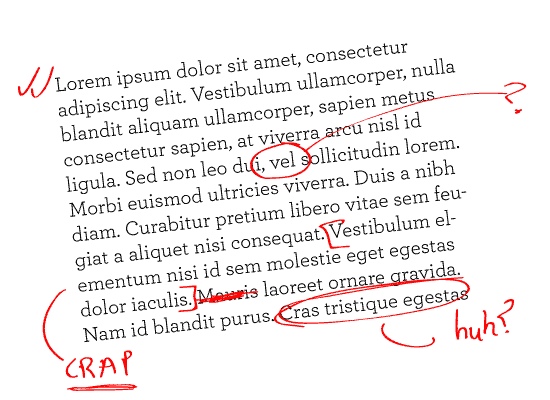I’ve spent a great slice of this year overseeing a bunch of talented contributors as one third of the On Dit magazine editorial team. If you’re interested in working in the media, or just want to contribute to the conversation going on around you, there’s nothing I could recommend more highly than writing, illustrating, or designing for your student paper.
Our term being almost over, and with a TINA workshop looming, I thought it’d be fitting to try to vaguely codify what (if anything) I’ve learnt over a year as the editor of a student magazine.
Your magazine will never be The New Yorker
I suspect this is something editors of student magazines struggle with more than anything: there’s a gap between the scope of your ambition and the reality of your situation. You dream of birthing the love child of The New Yorker and Vice, McSweeney’s Quarterly and ‘7os-era Rolling Stone, Good Housekeeping and Extreme Sports Monthly (you get the idea). The difference is that you’ve got a tight print budget, a small pool of contributors, time constraints, and no towering pyramids of cash with which to lure your writers to risk their lives to get that article you think is just screaming to be written. If you’re anything like me (pathologically overcritical), every issue you publish will represent a kind of failure: a failure to create the perfect magazine that you’d actually want to buy. (Harsh, I know). If you’re a writer, you know this kind of feeling: you compare yourself to Tolstoy or Dickens (or Franzen or Murakami), come up wanting, and think, “Why bother?” It’s a trap you never want to fall into, because it can leave you feeling paralysed. You can’t wait until your work is perfect before releasing it into the world. As an editor, that means sometimes locking in a deadline and saying, “After this date, no matter what happens, we have to stop tinkering and just send what we’ve got to the printers.” And it can be a shame if not every piece is properly fact-checked, or if the layout isn’t perfectly gridded, but the alternative is not releasing anything at all.
[Update: over at Twitter, @flawrencee has reminded me of a wonderful video in which Ira Glass manages to explain this “Good Taste Gap” theory with his usual mind-shattering eloquence].
Contributors are your sparkle-makers
Something that editors need to recognise is the importance of treating contributors with respect. This is something we struggled with at times: after all, it can be hugely frustrating when a writer misses deadline, or files a piece that doesn’t match up to the brief. But I’ve contributed to enough magazines myself to realise that there’s nothing that can cheese a writer off more than working hard on a piece only to receive a snarky email from an editor saying, in only slightly softened terms, “Thanks for fucking up, shithead.” Even if the contributor did fuck up, they also went out of their way to create original content to make your publication sparkle. That’s pretty cool, no?
The concept of ownership comes into play, here. Editors can feel as though they “own” a magazine, which involves conceptualising contributors as expendable fluff-makers. Great editors should make contributors feel as though their work is integral to the success of the publication.
Don’t let ass-hats walk all over you
So, here’s the flipside to the “don’t be a jerk” rule: some would-be contributors can be real shits. Some will attempt to bully you into publishing a piece, promoting a show, or printing a letter. They’ll threaten you with accusations of censorship. They’ll threaten to take you to court unless you print or retract something-or-other. But, hey, here’s the thing: if you don’t want something in your magazine, don’t put it in there! Your obligation is to your audience. Publish what you’d like to read, and publish what you believe is of interest.
Trust yourself.
[Update: If you’re a student media ed, I’m interested: what do you feel you’ve learnt over your term?]

Comments
3 responses to “Editors Are Jerks: or, Stuff I’ve Learnt Editing a Student Magazine”
I’ve learnt there’s no point in being a martyr, one has to ask for help. Also, that forming good relations with your writers and illustrators matter (you’re not paying them, so you can’t just rely on their professionalism, it’s important to make them feel valued). Oh, and that student media editors are awesome.
I’ve learnt that you can’t expect a contributor to trust your judgement, just because you have learnt to trust the judgement of those that edit your work. As a writer, I understand that if a publication is willing to publish my work, they hold the right to make any changes they see fit; it becomes their prerogative, as long as they are not falsifying my work. As an editor of a student publication I have had to be more flexible with these ideals. I have had to approach my contributors with more consideration than I expect from editors. I spend time making sure they are comfortable with my changes and ensure they understand why I have made specific changes to their work. They need support, because as you say Connor, they aren’t being paid and they are the reason student magazines can exist. I have also learnt to develop a thicker skin, which has been great! At the end of the day though, I am still learning and can only do my best. I have encountered all that you have written above and it is nice to know I’m not alone! haha
[…] few weeks back, my co-editor Connor O’Brien put up a post looking at what he’s learned over the year we’ve edited On Dit together. This got me thinking about my time as editor, and what I’ve […]